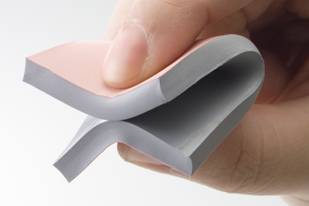2007 News
Shin-Etsu Chemical has developed a thermally conductive silicone rubber sheet with super-low hardness
It provides superior heat dissipation even on uneven or non-flat heat-generating surfaces of electronic devices.
Shin-Etsu Chemical Co., Ltd. (President: Chihiro Kanagawa; Head Office: Tokyo), has developed and begun to market a new super-low hardness thermally conductive silicone rubber sheet, a product called the “TC-SP-1.7 Series”. This product features a super-low degree of hardness, which is about 1/10 lower (Asker C: Hardness 2) than that of Shin-Etsu's existing low-hardness product, and at the same time, the new product achieves a high thermal conductivity of 1.7 W/m・K. Consequently, when compared to existing low-hardness products, it has the properties of better pliability and adhesiveness, and for this reason it exhibits a superior heat-dissipation effect, even on uneven or non-flat heat-generating surfaces. This new product bonds tightly to the heat-generating electronic devices and the heatsink, thus providing more efficient cooling. Furthermore, because it can also be used on uneven or non-flat surfaces, it can enhance flexibility in product design.
Eight kinds of the standard sheets are available with eight different thicknesses: 0.5, 1.0, 1.5, 2.0, 2.5, 3.0, 4.0 and 5.0mm. In addition, the dimensions of each sheet are 300mm×400mm, and it can respond to smaller size for half-cut processing.
Silicone-based thermal interface materials for heat-dissipation applications, when compared with other materials such as acrylic resin types, are superior in thermal resistance and long-term reliability and possess a high level of flame-retardance (UL-94: V-0). Thus, silicone-based thermal interface materials are contributing to the improvement in performance and reliability of electronic devices.
These heat-dissipating thermal interface materials are thermally conductive compounds consisting of a combination of silicone rubber and a high ratio of thermally conductive fillers. By fitting these sheets tightly between the heat-generating unit, such as a computer's CPU, and the heatsink, it is possible to effectively conduct the heat to the heatsink. Demand for thermally conductive silicone rubber sheet is expanding for such heat-dissipation applications as in the growing number of electronic components in automobiles as well as in PCs, home appliances, and electronic game units. Moreover, due to the increasing miniaturization and higher performance of electronic devices, the need for the more effective heat-dissipation materials is further increasing.
In addition to its various kinds of thermally conductive silicone rubber sheets, Shin-Etsu Chemical has a line-up of various other thermally conductive silicone materials such as grease-type, gel-type and liquid rubber-type products that possess excellent adhesiveness. Depending on the application, it is possible to meet various heat-dissipation requirements, and Shin-Etsu will go forward with product development to meet the future needs of a market that will have even more sophisticated needs.
Silicones are highly functional materials that combine characteristics of both organic and inorganic materials. They are materials that provide high value-added features for products in a wide range of industrial fields, including electrical and electronic applications, automobiles, construction, cosmetics and chemicals.
Reference Data
General Properties
| Parameter | TC-100SP-1.7(Thickness 1.0mm) |
|---|---|
Color |
Gray/Reddish brown |
Sheet Size mm |
300×400 |
Sheet Thickness mm |
0.5, 1.0, 1.5, 2.0, 2.5, 3.0, 4.0, 5.0 |
Density g/cm3 |
2.32 |
Hardness Asker C |
2 |
Dielectric Breakdown Voltage kV |
20 |
Dielectric Strength kV |
16 |
Specific Heat J/g・K |
1.04 |
Thermal Conductivity W/m・K |
1.7 |
Thermal Resistance °C/W |
1.00 |
Flame-Retardance UL-94 |
V-0 |
Low-molecular-weight siloxane conten ppm |
200(ΣD3-10) 540(ΣD11-20) |

Super-low hardness thermally conductive silicone rubber sheet
